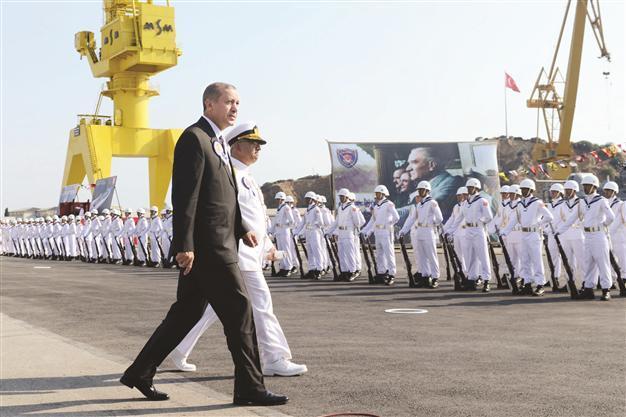Turkey’s major defense contracts await political calm
BURAK BEKDİL

This file photo shows Prime Minister Recep Tayyip Erdoğan during the handover ceremony Büyükada corvette. Selecting another shipyard for the construction of four new corvettes under the MILGEM program is a decision that should be made. CİHAN Photo
The political turbulence that has shaken Turkey since the Dec. 17 corruption investigations began has unnerved the country’s defense procurement bureaucracy and industry, with insiders expressing divided opinions over how the turmoil may affect major programs.One defense procurement civil servant said the potential net effect would be a slowdown in decision-making as most officials will be unwilling to take the initiative on multi-billion dollar contracts for fear of being associated with potential corruption allegations.
Typically, he said, officials would be extra-careful “not to fall victim to slandering.” But that’s not the only complication: Both the bureaucracy and industry are carefully watching Prime Minister Recep Tayyip Erdoğan’s short-term political moves. Erdoğan in recent years has effectively become the sole decision-maker in defense procurement.
In October 2012, the government introduced a new set of rules to regulate procurement and broaden the jurisdiction and administrative powers of the civilian procurement agency, the Undersecretariat for Defense Industries (SSM). Under the new rules, a program can begin when a military request for a weapons system has been approved by the SSM and the defense minister. The SSM is solely responsible for determining the ideal modality for every procurement program. It also has powers to buy from a single source when it deems it necessary due to “the national interest, confidentiality, the monopoly of technological capabilities and the meeting of urgent requirements.”
Analysts said the new rules, coupled with the profile of the new top brass, approved last August by Erdoğan, meant a one-man show in procurement in the form of the powerful personality of the prime minister.
“There is too little the top brass can say over the fate of how defense contracts should evolve,” said one analyst. “The big question is if and how much the prime minister may be distracted by the elections.”
Erdoğan, who has been elected prime minister three times since 2002, is organizing his party for critical local elections on March 30. He is widely believed to be hoping to run for the presidency in summer 2014, and his party must face the challenge of parliamentary elections in 2015.
“This summer, we can have a new prime minister, a new defense minister and a new chief procurement official,” the analyst said. “And things may slow down.”
But some observers think the new political landscape could give pace to major decisions. One expert said Erdoğan, given his political options, may prefer to quickly wrap up big programs on which he and his civil servants have been working for years. “He may tend to make decisions before he quits as prime minister,” he said.
Turkey will decide, in about a year, whether to stick by a September 2013 decision to award a $3.44 billion contract to China Precision Machinery Import-Export Corp. for the construction of Turkey’s first long-range air and anti-missile defense architecture. Turkey has come under increasing pressure from its NATO allies, especially the United States, to change course. The Chinese contractor is on a U.S. list of sanctions as part of the U.S. Iran, Syria and North Korea Non-Proliferation Act. Turkey has said it would turn to European and U.S. bidders if talks with the Chinese contender failed.
Under Erdoğan’s leadership, the procurement bureaucracy will also decide whether to sign a $800 million contract with Sedef, an Istanbul shipyard partnered with Spain’s Navantia, for the construction of Turkey’s first Landing Platform Dock; select another shipyard for the construction of four new corvettes under the MILGEM program; decide whether to sign a multi-billion dollar deal with Sikorsky for the procurement of utility helicopters; pick up a serial production contractor for the Altay, an indigenously-developed new generation battle tank; and decide on the future of Turkey’s partnership in the U.S.-led, multinational Joint Strike Fighter program.
















